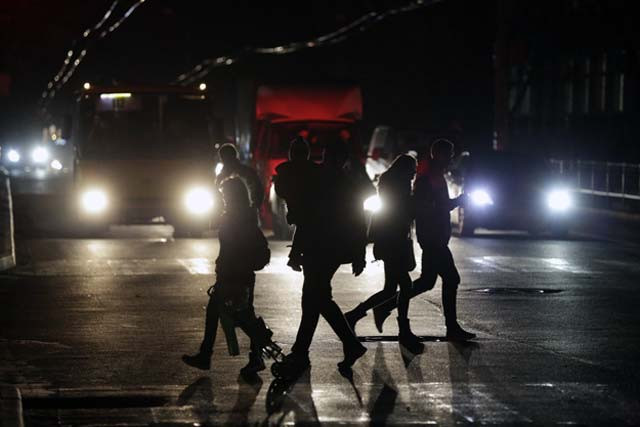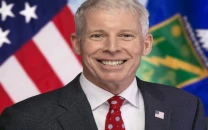Mental scars of war leave Ukraine troops battling suicide threat
The defence ministry says 171 soldiers committed suicide in 2014 and 2015

People cross a road during a power outage in the Crimean city of Simferopol on November 24, 2015. Power cuts in Crimea affected nearly 940,000 people on November 24 as tensions raged between Kiev and Moscow over the annexed peninsula and Russia threatened to cut off gas supplies to Ukraine. PHOTO: AFP
Haunted by the recollection of seeing two comrades blown apart before his eyes in fighting with pro-Russian rebels, Galtsov, 24, got drunk one day and jumped from a third-floor window in a bid to end his life.
Power outages plague Crimea as Russia threatens to cut Ukraine gas
Now a year on, the young man lies on a hospital bed in a small town near Kiev, still unable to talk and barely recognising relatives due to the injuries he sustained in the fall.
"Look at me, Artur. Look at me. You have made great progress, we are so proud of you," a doctor says to him gently.
As the conflict in east Ukraine has plunged the region into bloodletting and seen thousands of young men called up to fight in their own country, Galtsov's story is far from unique.
Suicide is the main cause of non-combat losses in the Ukrainian army since the beginning of conflict.
The defence ministry says 171 soldiers committed suicide in 2014 and 2015 but volunteers working with ex-combatants say the real figure is much higher.
"We know perfectly well that there are a lot of suicides among those guys, who took part" in the fighting, says volunteer Kseniya Negrey, who has been taking care of Galtsov since his arrival at the private clinic.
"There is a moment between the return from the conflict zone and coming back home, when they start drinking, when they just can't cope without their comrades around."
The fighting in east Ukraine has for the most part been waged by inexperienced soldiers firing Soviet-era mortars and rockets at rebels across a sometimes narrow frontline.
Psychologist Tetiana Nazarenko from the Povernennya (Return) trauma treatment centre in Brovary, a town outside Kiev, says that witnessing the devastating impact leaves psychological scars.
"The worst thing in terms of psychological effects is when they evacuate the bodies", she told AFP.
Russia upholds 20-year sentence for Ukrainian film maker
"Very often these bodies are in pieces, they are in a bad state and coming into contact with them is very tough."
Not only that, but given the stop-start nature of much of the fighting in the conflict, which Kiev and the West says involved Russian troops; the long periods of waiting for an attack took a heavy mental toll on the soldiers.
"There is psychological exhaustion because of the waiting, they start to think; what are we doing here, why are we here? We want to go home," she said.
Semen Gluzman, the president of the Ukrainian Psychiatric Association, says that alcoholism and drug addiction are the biggest problems Ukrainian soldiers face.
What they need above all are not psychologists and psychiatrists, but qualified social workers and loving care from family members to help them readjust after the fighting.
"A man comes back home after a year's absence, after a year of sitting in trenches, losing touch with his family and a normal way of life, after getting used to living in danger," Gluzman said.
"The experiences he had at war are something he must learn to live with. His pain will decrease with time, but initially he needs social assistance", Gluzman adds.
But, while the Ukrainian parliament this month passed a law making it mandatory for soldiers to go through a programme of psychological rehabilitation after coming back home, Gluzman says the government provision is woefully inadequate.
No one knows when the mental health screenings will start to happen and how such a massive scheme will be handled.
"This is a nonsense", Semen Gluzman says, spreading his hands widely.
Eurasia: a new political entity
Even if measures are put in place to treat soldiers as they come back from the front, Gluzman says the conflict in Ukraine will have a long psychological impact on those who fought.
"It's too early to diagnose war traumas now, they will reveal themselves later," he adds.
"This is a problem that will last for years, for decades. This is something Ukraine will be dealing with for a very long time."



















COMMENTS
Comments are moderated and generally will be posted if they are on-topic and not abusive.
For more information, please see our Comments FAQ